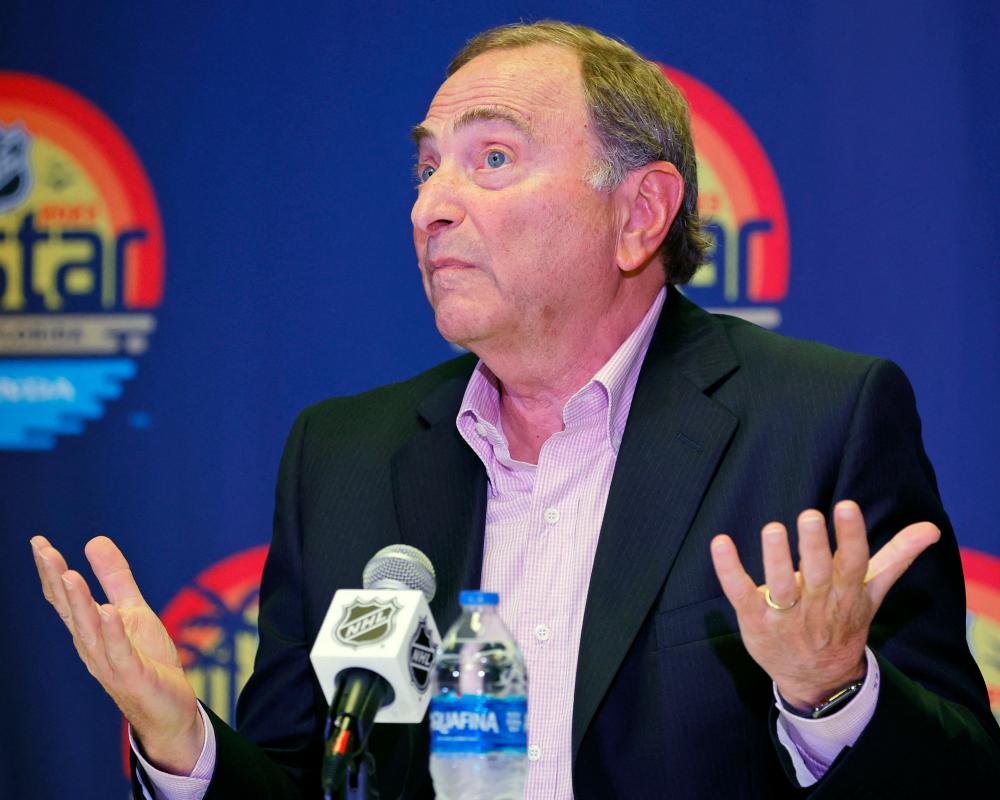“Diverse representation within inclusive environments is proven to advance innovation, creativity, and decision-making – all of which are critically important to the growth of the sport and our business,” NHL commissioner Gary Bettman wrote in his introduction to the NHL’s first – and only, so far – diversity and inclusion report, which it released in 2022. “Recognizing these facts, we are working to better understand and accelerate our engagement across all layers of diversity – including nationality, race, gender identity, sexual orientation, disability, and religion – and their nuances and intersections,” Bettman continued.
Last week, Bettman was named alongside NHL legend Wayne Gretzky, Florida Panthers’ captain Matthew Tkachukx6x and various representatives of other sports as a member of Donald Trump’s sports council. The council will be responsible for – among other things – playing an “important role in restoring tradition to college athletics, including … keeping men out of women’s sports.” Not what you’d call an opportunity for Bettman et al to gain a better understanding of the nuances of gender identity, by the sounds of it.
This is not the first time Bettman has given mixed messages around social issues. In 2023, for example, NHL tried to host a career fair aimed at recruiting a more diverse workforce (its inclusivity report noted that the league’s employees were roughly 84% white and 93% straight). The event, attached to that year’s All Star Game in Florida, quickly caught the attention of the governor’s office, which accused the NHL of discrimination – against white people. The league cancelled the career fair.
A few weeks later, the NHL again had the opportunity to stand for its diversity values when a handful of players refused to wear their team’s Pride-themed warmup jerseys. Instead, the NHL retreated meekly, encouraging “voices and perspectives on social and cultural issues.” That June – Pride month, no less – Bettman cancelled the Pride jerseys altogether, calling the furor around them “a distraction” from the intended message.
One wonders what he will call his own foray directly into the culture wars or, for that matter, how the NHL may characterize this particular moment of self-expression from the commissioner. It’s likely that Bettman’s participation in Trump’s sports council will fall into the “voices and perspectives on social and cultural issues” category the league talked about during the Pride jerseys fiasco. But seeing as the Trump seems fixated on getting trans women out of college sports – even though there are fewer than 10 transgender athletes in college sports, according to the president of the NCAA – this feels like a very specific kind of perspective on a cultural issue, doesn’t it?
What’s so aggravating about repeated allowances for anti-LGBTQ+ perspectives from the NHL under the guise of simply letting all opinions flourish equally, is how it pretends that these views are all morally equivalent when they’re not. Sure, the players who refused to wear a Pride-themed jersey can’t be forced to wear them, but it’s not like it was simply a fashion choice. Fundamentally, those players made that decision based on a worldview that refuses to accept LGBTQ+ people, including their fellow hockey players, as being equal to them and everyone else. It’s not the jerseys that were the problem – but they did a great job highlighting it.
Earlier this spring, Harrison Browne, the first transgender player in professional hockey, wrote that while in the NCAA, he was offered the option to have his own locker room and change his pronouns on the roster. “Looking back, I realize how important it is for trans and non-binary student athletes to have those options, whether or not they take them,” Browne wrote in The Walrus. “These choices provide a baseline of institutional acceptance and acknowledgment for gender-diverse athletes at all levels.” On Monday, Browne told the Guardian via email that “to see [Bettman, Gretzky, and Tkachuk] get behind an administration that is targeting marginalized communities, especially trans people in sports, is deeply disturbing and a huge step backwards in making hockey a more inclusive sport.”
And going backwards really isn’t Bettman’s thing, or it never used to be. When he accepted his job as commissioner in 1992, he told a room full of reporters that “the way a league performs well is by making its product as attractive as it can to the greatest number of fans.” He believed in growth, in other words – even up until 2022. What he risks now is stagnation, regression even. On that same day in 1992, Bettman said that he wanted to make hockey, a sport that at the time was seen as violent and retrograde, more “user-friendly.” And he acknowledged that to do it, he’d need to push some of the older owners into the future. “It may be that we are going to head in new, progressive directions that will make sense to every one immediately,” Bettman said. “For some, it may take a little more time.”
Maybe the diversity and inclusion stuff doesn’t totally make sense to Bettman in 2025 – other North American sports have decided that they don’t have the stomach to fight the culture wars under Trump either, and NFL commission Roger Goodell is also on the White House sports council. But Bettman should give the league’s diversity policies time to grow, rather than deliberately reversing course, hurting hockey’s players and fans, and ultimately jeopardising the future success of the sport for everyone. If that’s too much to ask, at the very least, if he’s invited to join a club created by a hostile and retrograde president, he should by now have the smarts to just say no.
